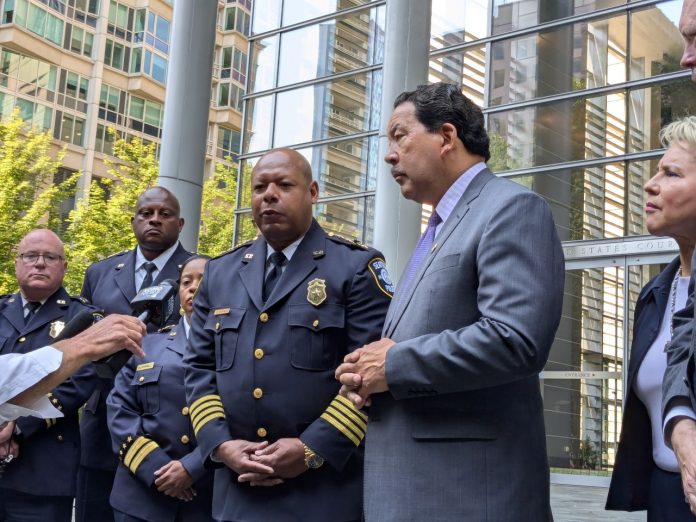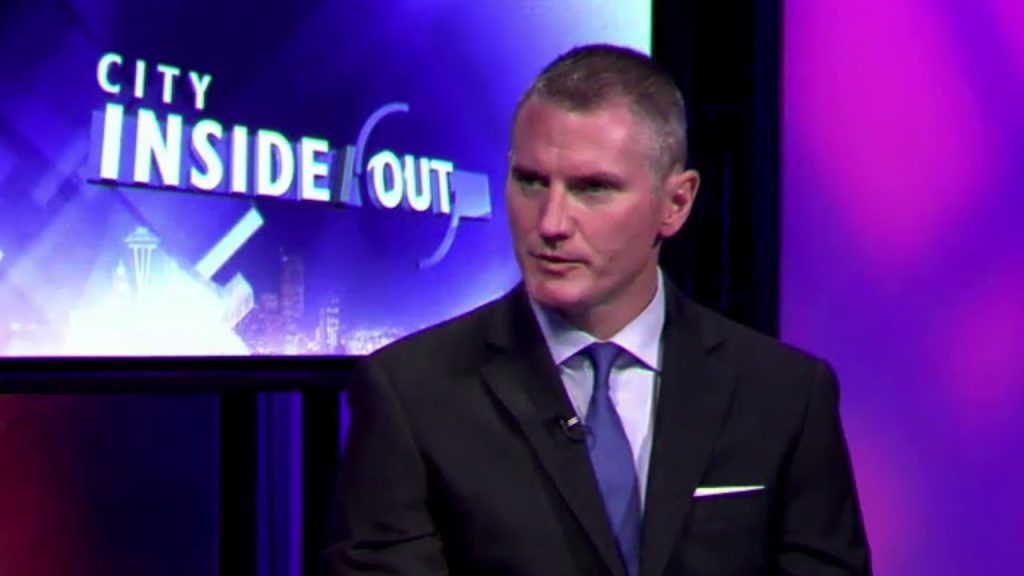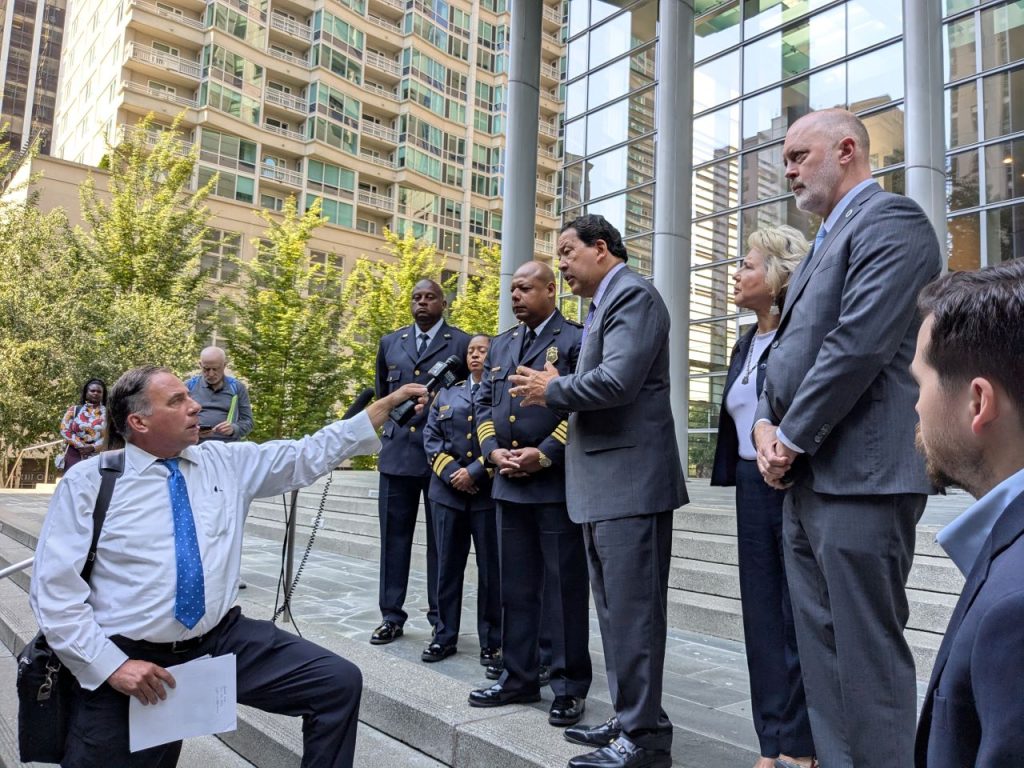
Advocates say huge issues remain at SPD, with more reforms needed.
U.S. District Judge James Robart granted the motion to terminate Seattle’s consent decree on Wednesday, ending a saga of federal police oversight that began 15 years ago.
In August of 2010, deaf Indigenous woodcarver John T. Williams was shot and killed by a Seattle Police Department (SPD) officer, a shooting that was later found by SPD’s Firearms Review Board to be unjustified. In December of 2010, 35 community organizations, spearheaded by the ACLU of Washington, wrote a letter to the Department of Justice (DOJ) asking to initiate an investigation into the SPD’s excessive use of force.
The DOJ’s investigation found a pattern or practice of constitutional violations regarding the use of force, as well as concerns about biased policing. Investigators found that SPD officers used force in an unconstitutional manner almost 20% of the time and used unnecessary or excessive force when arresting individuals for minor offenses, especially when mental illness, drugs, or alcohol were involved. Over 50% cases of SPD using unnecessary or excessive force involved minorities.
As a result of these findings, Seattle entered into the consent decree in July 2012. Over the course of the following 13 years, the City said it spent $127 million on policing reform measures, though other sources have estimated the figure was higher and exceeded $200 million.
Consent decree-related changes include additional documentation, data dashboards, trainings in deescalation, crisis intervention, and avoiding bias, and the launch of a new three-prong accountability system consisting of the Office of Police Accountability (OPA), Office of the Inspector General (OIG), and the Community Police Commission (CPC).
Robart said he finds SPD to now be in full and effective compliance with the consent decree. He noted that in 2024 with 8,300 crisis incidents, SPD only used force 1.33% of the time. Further, he said that type 3 force, which is the most serious, was only used in 0.002% of calls for service — 1 out of every 50,000 calls.
“We believe that returning control of our police department to the people of Seattle is the most appropriate next step, as democratic policing works best when officers have the trust and confidence of their communities,” Mayor Bruce Harrell wrote.
Bias and excessive force concerns linger
In spite of the consent decree coming to an end, many concerns remain around policing in Seattle.
In spring of 2023, The Seattle Times reported that one data scientist’s analysis showed that police killings actually rose while the department was under federal oversight.
“The Seattle Police Department is not a transformed institution, and ending the consent decree does not make today’s court decision the success the city claims it to be,” said Jazmyn Clark, smart justice policy program director for the ACLU of Washington. “Racial disparities remain, and use-of-force issues persist with SPD – including most recently when officers used excessive force on counter-protesters at an anti-LGBTQIA2S+ event this past spring.”
In 2022 the Seattle Police Monitor issued findings that SPD detains Black and Indigenous people at much higher rates than White people, even though White people are more likely to be found with a weapon when frisked. SPD is more likely to detain minorities than White people when they are in similar situations, and the chances of an individual being stopped and frisked increased “the more the individual did not match the racial composition of the neighborhood the individual was stopped in.”
Robart said that one of his biggest worries going forward are racial disparities. “That’s something that the Chief will need to continue to work on, and I have his commitment today that he will do so,” Robart said.
Advocates have framed the consent decree as one of the meaningful obstacles to community advocacy efforts when it comes to policing in Seattle, while contributing to a bloated police department budget. Robart warned the city council away from defunding efforts back in 2020, and he blocked an ordinance the council passed to ban police from using tear gas, blast balls, and other less lethal weapons.
On the other hand, the uproar over the police crackdown on protesters in 2020 ultimately doomed former Mayor Jenny Durkan’s efforts to end the consent decree during her term.
The council passed a new less lethal weapon ordinance in February, the final requirement for the City to exit the consent decree. The ordinance states that SPD can use weapons such as tear gas, pepper spray, and blast balls if “specific facts and circumstances are occurring or about to occur that create an imminent risk of physical injury to any person or significant property damage.”
How SPD will use these weapons in the face of another mass protest movement like the George Floyd protests in 2020 remains an open question.
Meanwhile, Real Change documented how, in 2020, Harvard consultant Antonio Oftelie co-wrote an op-ed with SPD without disclosing SPD’s participation to the publisher. He was selected to become the Federal Monitor charged with overseeing the consent decree a month later, at which point he too warned the council not to reduce SPD’s funding.
Long-time police accountability advocate Howard Gale is concerned about data he says is missing from SPD crisis contact incidents, which he says means the department’s claim that SPD didn’t kill anyone who was experiencing a mental health crisis in 2022 is false. He says nine people experiencing a mental health crisis were killed by SPD between 2015 and 2022 and were either not included in the crisis contacts dataset or not recorded as having died.

One of these cases is that of Charleena Lyles, who was shot in her apartment in 2017 by an SPD officer after brandishing two knives at two officers present to take a burglary report. SPD’s General Counsel Rebecca Boatright confirmed that this case was not classified as a crisis contact.
Boatright told The Urbanist that officer involved shootings aren’t usually categorized as crisis calls, as one of the primary purposes of the categorization is to collect information to better help individuals in the future. These incidents would show up in use of force data, however. Boatright said there are often disputes between crisis intervention specialists as to whether a specific person was experiencing a mental health crisis at a given time, while emphasizing there are 16,000 crisis contacts per year, all of which are thoroughly reviewed.
This example illustrates that choices about data categorization can lead to different narratives. Advocates worry that SPD is padding its statistics in order to support their narrative that the department is reformed and on the right track, with Gale writing that “this data is severely flawed.”
“One death caused by the police department is one death too many,” Harrell said. “But we have to recognize there are times where lethal force is necessary.”
SPOG contract negotiations
Robart’s other chief concern is the City’s contract negotiations with the Seattle Police Officers Guild (SPOG). He mentioned the “neutering” of Seattle’s accountability ordinance three separate times during the final consent decree hearing and spoke of Congress removing everything but wages and hours from similar police guild negotiations in Washington DC.
“I believe that collective bargaining, which is left for the city to negotiate accountability, may well not be the best way to do it,” Robart said. “I think that SPOG has skillfully used its new contracts to advance its members’ position, and I would see greater balance with the community’s interest.”
Harrell told the judge that he felt the City has done a “pretty good job of getting as much as we can get.” Last year’s SPOG contract gave officers a 24% raise while obtaining only minor accountability improvements, largely ignoring accountability advocates’ requests after they had waited since 2018 for a chance of restoring or expanding to further reform efforts. While the 2024 contract cleared the way for the expansion of the civilianized Community Assisted Response & Engagement (CARE) department, it capped CARE at 24 responders and required a dual-response model with heavy police involvement.
“Now I think what it’s going to hinge upon is the people on the other side of the table – the Seattle Police Officers Guild – to recognize where we must go in modern policing, and I’m convinced that they get it,” Harrell said to the judge.
After the hearing, Harrell said he’s confident that the City will finalize labor negotiations with SPOG by the end of the year, resulting in a new contract.
“They understand the accountability issues,” Harrell told the press. “They understand the growth of the CARE department, which again, is a bargain for condition of employment, so we’re very optimistic.”
To many reformers and accountability advocates, it is unclear whether SPOG does, in fact, “get” it.

SPD had six members attend the January 6th insurrection, the highest attendance of any police department in the nation. In mid-August, SPOG’s president Mike Solan released a new podcast in which he interviewed D.C. Police Union Chairman Gregg Pemberton. The two men discussed the federal takeover of the DC police department in August, an intervention Pemberton said he welcomed. Solan said he was glad Pemberton was “supporting Trump’s move.”
“Pay attention to what’s happening in the District of Columbia because it is the blueprint of what you’re going to see nationwide when it comes to the Trump administration’s public safety actions,” Solan replied.
Solan was elected to his leadership position by SPD’s rank and file.
When The Urbanist asked about this podcast, public safety Chair Bob Kettle said it was “very concerning.” Kettle forcefully opposes the idea of federal intervention in Seattle’s public safety landscape.
“We’re creating a changed dynamic in terms of addressing our public safety challenges,” Kettle said. “We don’t need the National Guard because we’re already working these pieces.”

Kettle also said that culture change within an institution takes time.
When speaking about the department’s culture to the judge, Shon Barnes appeared to agree that more time is needed. Barnes has been serving as Seattle’s police chief since the end of January.
“Culture is what you allow and what you don’t allow, and you change culture by not allowing the behaviors that you don’t agree with, and those behaviors that you do agree with you have to uplift those,” Barnes said. “We haven’t done a good job of that.”
“Our support for termination does not mean SPD has finished its work,” the CPC wrote in a statement. “The Seattle Police Department has more work to do towards rebuilding trust with communities most impacted by policing.”
Robart asked for Harrell’s commitment to continue funding Seattle’s three accountability bodies, and Harrell responded that none of them will be defunded in his 2026 proposed budget.
Referencing a quote by Winston Churchill, Robart closed out the hearing by saying, “I task the mayor and the chief of police to be mindful that it’s not the end, but it could be the beginning of the end.”
Amy Sundberg is the publisher of Notes from the Emerald City, a weekly newsletter on Seattle politics and policy with a particular focus on public safety, police accountability, and the criminal legal system. She also writes science fiction, fantasy, and horror novels. She is particularly fond of Seattle’s parks, where she can often be found walking her little dog.


